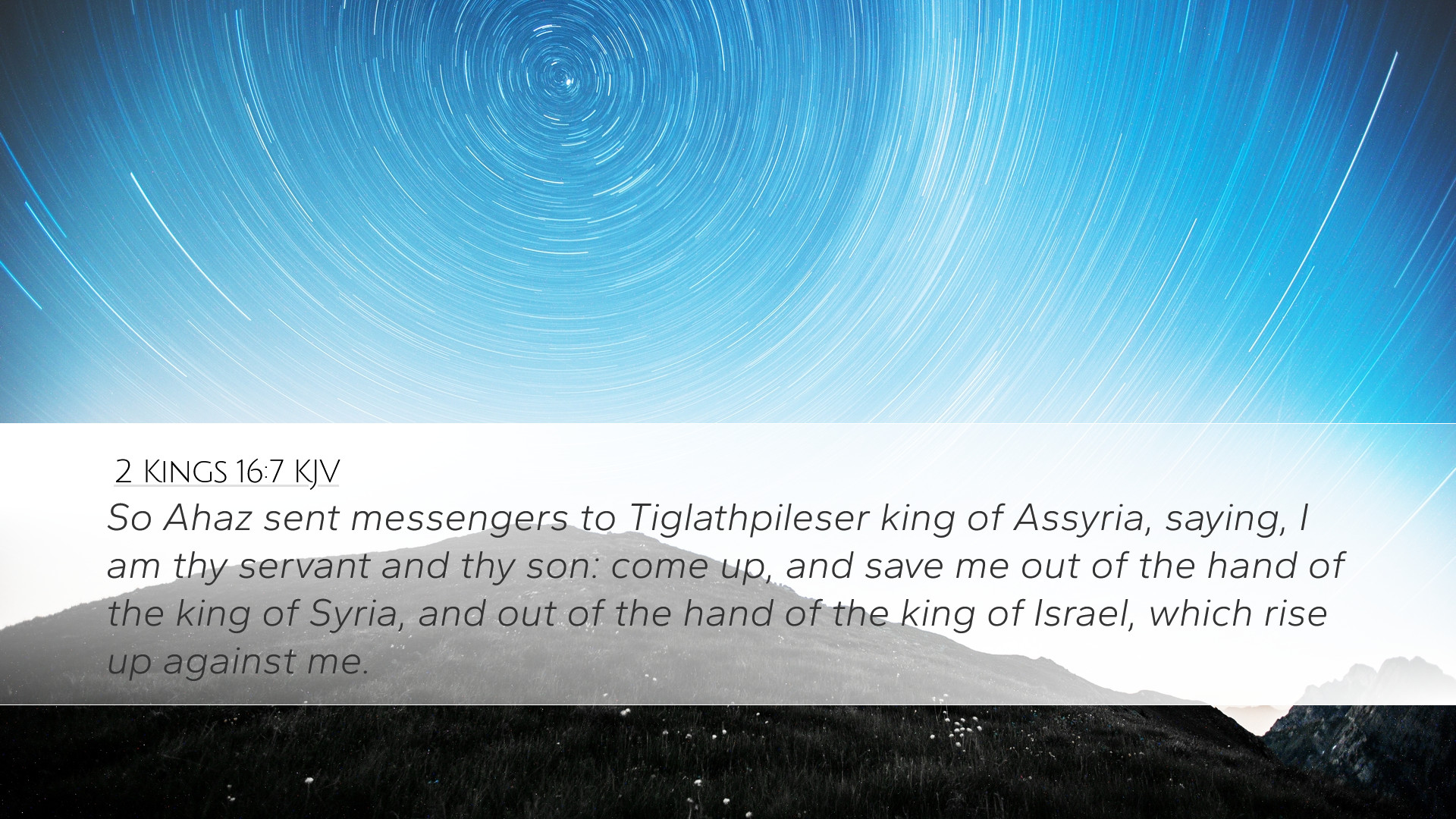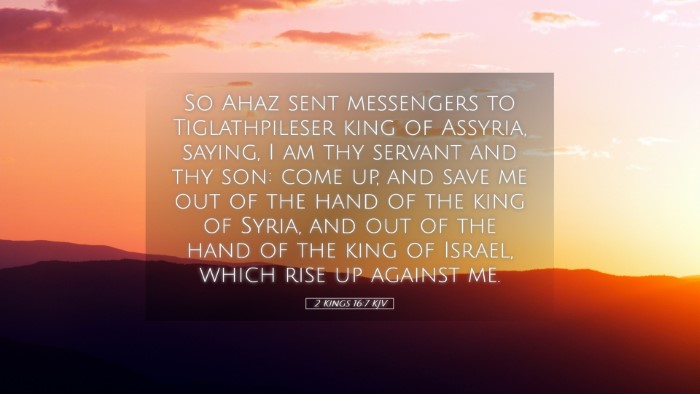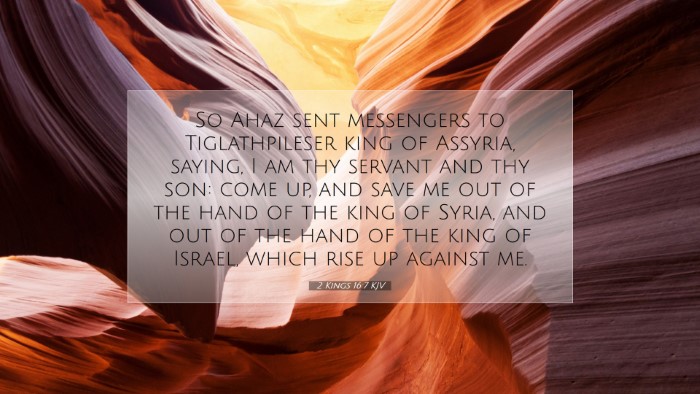Old Testament
Genesis Exodus Leviticus Numbers Deuteronomy Joshua Judges Ruth 1 Samuel 2 Samuel 1 Kings 2 Kings 1 Chronicles 2 Chronicles Ezra Nehemiah Esther Job Psalms Proverbs Ecclesiastes Song of Solomon Isaiah Jeremiah Lamentations Ezekiel Daniel Hosea Joel Amos Obadiah Jonah Micah Nahum Habakkuk Zephaniah Haggai Zechariah Malachi2 Kings 16:7
2 Kings 16:7 KJV
So Ahaz sent messengers to Tiglathpileser king of Assyria, saying, I am thy servant and thy son: come up, and save me out of the hand of the king of Syria, and out of the hand of the king of Israel, which rise up against me.
2 Kings 16:7 Bible Commentary
Commentary on 2 Kings 16:7
Verse Text: "So Ahaz sent messengers to Tiglath-Pileser king of Assyria, saying, 'I am your servant and your son; come up and save me from the hand of the king of Syria and from the hand of the king of Israel, who rise up against me.'
Introduction
In this verse, we find the character of Ahaz, king of Judah, at a critical juncture in his reign. Faced with the dual threat of an alliance between Syria and Israel, Ahaz turns to the king of Assyria for support. This response reveals much about his faith, his understanding of sovereignty, and the political dynamics of the ancient Near East.
Historical Context
Ahaz's reign (circa 736-720 BC) took place during a tumultuous period marked by escalating conflict between neighboring nations. The Assyrian Empire, under King Tiglath-Pileser III, was expanding aggressively, while Israel and Syria were united against Judah. Understanding this backdrop is essential for grasping the significance of Ahaz's actions in 2 Kings 16:7.
Commentary Insights
Matthew Henry's Commentary
Matthew Henry emphasizes that Ahaz's request for help from Assyria demonstrates a lack of faith in Yahweh. Instead of seeking divine assistance, Ahaz opts for political maneuvering. Henry notes that this reliance on a foreign power symbolizes a departure from the covenantal faithfulness expected of a king of Judah.
- Ahaz refers to himself as "your servant and your son," indicating an attempt to submit to Assyrian authority and gain favor.
- This plea for aid underscores the spiritual decline of Judah and highlights the dangers of aligning oneself with worldly powers rather than trusting in God.
Albert Barnes' Notes
Albert Barnes provides a detailed analysis of Ahaz's desperation. He points out that Ahaz's appeal to Tiglath-Pileser reveals a critical moment of weakness:
- Barnes asserts that Ahaz views the situation as dire enough to warrant an alliance with a nation known for its brutality and idolatry.
- The phrase "come up" denotes an invitation for Assyrian military intervention, which would ultimately lead to significant repercussions for Judah.
- He also remarks on the political implications, suggesting that Ahaz's action not only puts Judah under Assyrian influence but also reflects a misunderstanding of God’s sovereignty.
Adam Clarke's Commentary
Adam Clarke provides a theological perspective on the implications of Ahaz's actions:
- Clarke suggests that Ahaz's misguided appeal for assistance indicates his failure to recognize the protection offered by Yahweh, which he could have accessed through faith and repentance.
- He discusses the notion of servitude and kingship, noting that by aligning himself with a foreign king, Ahaz effectively demotes himself and his kingdom's authority.
- Clarke warns that such decisions—relying on earthly regimes over divine guidance—lead nations into moral and spiritual peril.
Theological Implications
The events surrounding 2 Kings 16:7 offer a vivid illustration of the tension between faith and pragmatism in leadership. For pastors and theologians, this text serves as a reminder of the importance of trusting in God over human institutions.
- Faith in God: The narrative illustrates that true resilience and deliverance come only through faith in the Lord, not through alliances with worldly powers.
- Spiritual Decline: Ahaz's decision represents a significant decline in spiritual integrity, prompting reflection on how leaders today may similarly turn to secular solutions in times of crisis.
- The Cost of Alliances: The eventual consequences of Judah's dependence on Assyria will unfold in subsequent chapters, serving as a warning against compromising one’s loyalty to God for temporal security.
Application for Modern Readers
For contemporary believers, this passage invites deep personal and communal reflection:
- How do we respond to crises? Are we prone to rely on human wisdom or external help rather than seeking God's intervention through prayer and faith?
- This text encourages a critical examination of our political alliances and values. Are they aligned with our faith, or do they reflect a misunderstanding of our dependence on God?
- Pastors, in particular, must consider how to cultivate a congregation that is firmly grounded in the belief that "our help comes from the Lord," rather than from political or social constructs.
Conclusion
2 Kings 16:7 stands as a powerful reminder of the necessity for faithfulness to God amidst life’s challenges. The choices we make in times of trouble reveal our theological convictions and understanding of power dynamics. Ahaz's plea to Tiglath-Pileser serves not only as a historical account but also as theological instruction that continues to resonate today.


